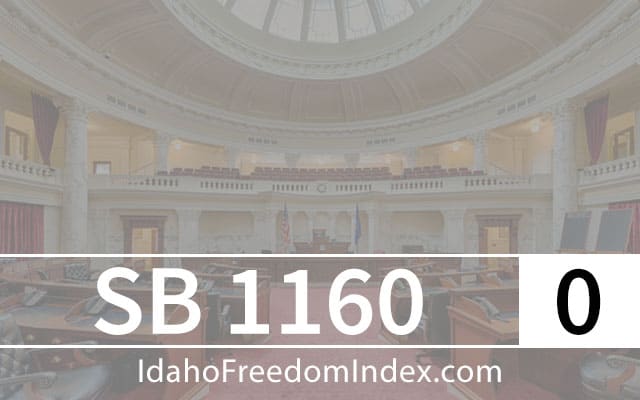


Bill description: Senate Bill 1160 would reform Idaho’s statewide liquor licensing system and allow municipalities to issue liquor licenses.
Rating: 0
Analyst’s Note: SB 1160 is a revision of SB 1040 from earlier this Legislative Session. SB 1040 made a more substantial rework of the state licensing system, however, it provided far more extensive grandfather rights to current licensees than SB 1160 would.
SB 1040 would have allowed grandfathered license-holders to transfer their licensees to any individual statewide. Under current law, license-holders can transfer their license to another individual—which leads to the secondary market for licenses and speculation—within the city where the license was issued.
Current license holders would receive the grandfather rights—which includes substantially reduced licensing fees, regulation by the state rather than the municipality, a larger discount on liquor and the ability to transfer or sell their licenses indefinitely. As a result, SB 1040 would have given existing license-holders additional benefits under the law.
The stated reason for having these grandfather rights is to ensure that those who have invested many dollars in their licenses do not lose the full value of their investments. SB 1040, it was argued, did this to protect property rights
But SB 1040 went far beyond simply maintaining the value of current licenses. Even someone whose licenses don’t hold value today would receive additional benefits indefinitely under the new law. For example, anyone who holds a non-transferable specialty license today—golf courses, wineries, ski resorts, equestrian facilities, waterfront resorts, theme parks and more— would receive the grandfather rights, even though their licenses hold no resale value now.
SB 1160 eliminates several of these indefinite benefits, while still proposing a solution for issuing municipal licenses for restaurants and lodging facilities and maintaining the value of the current licenses.
Does it increase barriers to entry into the market? Examples include occupational licensure, the minimum wage, and restrictions on home businesses. Conversely, does it remove barriers to entry into the market?
Under current law, entrepreneurs and restaurant owners can find it difficult to get a liquor license in many of the state’s cities. 64 out of Idaho’s 201 cities have a waitlist for obtaining a license from the city. Particularly in Idaho’s most populous cities, and in resort cities, the extreme scarcity of licenses can make it difficult to open or expand a business.
Idaho uses a quota system for liquor licenses that is based on population. The state can issue one license for every 1,500 residents within an incorporated city, provided that each city can issue at least two licenses, even if they have fewer than 3,000 residents. For a resort city, such as Ketchum or McCall, this can be particularly limiting. While there is very high demand for licensed establishments due to the steady stream of visitors, the population base caps the number of licenses at a very low level. As a result, anyone seeking a license can end up on a waitlist for many years or end up paying six-figures for a license on the secondary market.
SB 1160 would eliminate this artificial cap on liquor licenses by allowing local governments to issue municipal licenses to eating establishments and lodging facilities, such as a hotel with a conference center, and there would be no cap on such licenses. By expanding the list of government entities that can grant a liquor license, SB 1160 could give individuals in many cities the ability to open or expand their businesses.
(+1)
Under current law, establishments outside of incorporated city limits cannot obtain a traditional liquor license. Only facilities such as ski resorts, waterfront resorts, or golf courses can receive licenses.
SB 1160 would make it possible for business owners and entrepreneurs operating outside a city to get a municipal license from their county.
(+1)
Does it give government any new, additional, or expanded power to prohibit, restrict, or regulate activities in the free market? Conversely, does it eliminate or reduce government intervention in the market?
SB 1160 would require the servers at all licensed establishments to participate in an approved alcohol training program. This program would have to include an examination that covers the following topics: “monitoring a patron’s behavior, recognizing intoxicated persons, checking identification, recognizing false and altered identification, providing alternatives to alcoholic beverages, problem-solving in dealing with intoxicated or belligerent patrons and familiarity with Idaho laws and rules pertaining to alcoholic beverages.” (page 29, lines 36-40)
Anyone who is already a server would have to undergo the training within 120 days, while anyone subsequently hired would have to go through the training within 60 days of being hired. An individual who does not complete the training within the allotted time would be subject to a $500 penalty. The licensee that the server works for would also be subject to a $1,000 penalty.
(-1)
Does it violate the principle of equal protection under the law? Examples include laws which discriminate or differentiate based on age, gender, or religion or which apply laws, regulations, rules, or penalties differently based on such characteristics. Conversely, does it restore or protect the principle of equal protection under the law?
SB 1160 would specify by name the ServSafe Alcohol training programs, offered by the National Restaurant Association, and the Training for Intervention Procedures, offered by Health Communications Inc., as programs that meet the requirements for the mandatory training of alcohol servers.
(-1)


